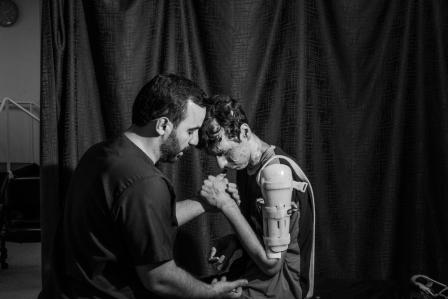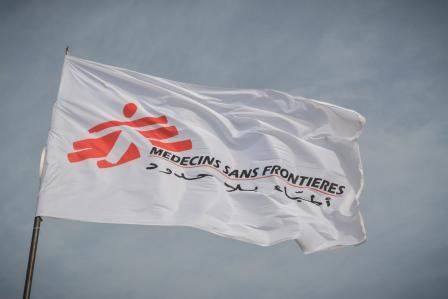Jenin: Staggering increase in Israeli attacks against civilians and healthcare
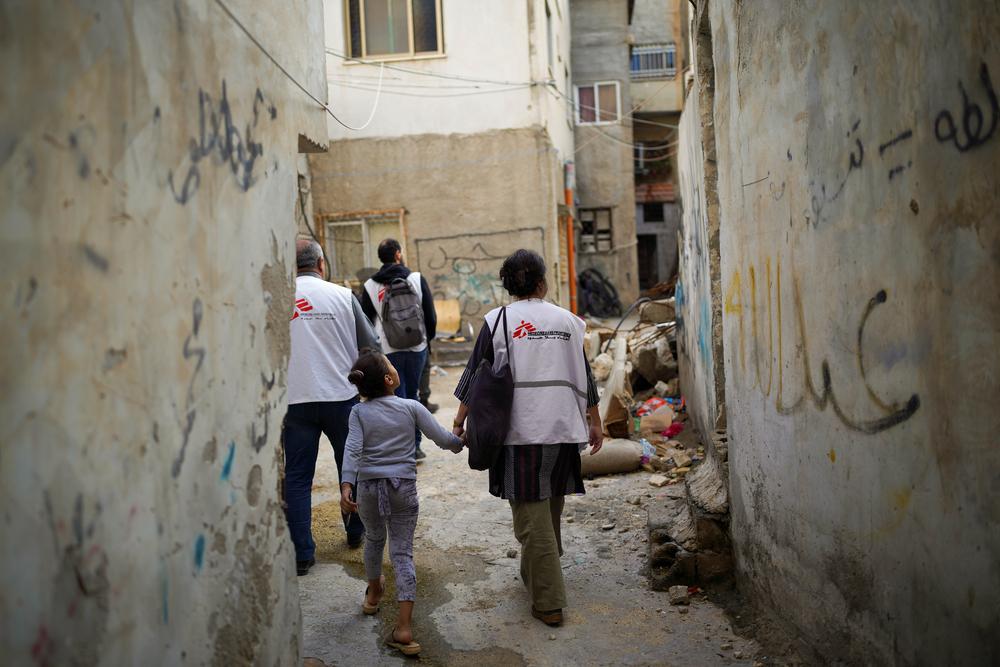
On 28 November 2023, Doctors Without Borders's International president, Dr Christos Christou visited Jenin refugee camp and Doctors Without Borders-supported Khalil Suleiman Hospital. Palestinian Territories, November 2023. © MSF/Tetiana Gaviuk
In the dim light of a hospital room, Amin, 17, is lying on a bed after being shot in both legs by Israeli Forces on 19 November 2023, during a ground and air assault on Jenin refugee camp in the northern West Bank.
Prior to October 7th in 2023, Israeli Forces had killed 205 Palestinians in the West Bank, while settlers were responsible for nine more deaths. Of these deaths, 52 occurred in Jenin alone.
On 19 June, Israeli forces began conducting air strikes in the West Bank, something that had not occurred since the second intifada in the early 2000s. Far from being an isolated event, this was to become more frequent. On 3 July, during a 48-hour military operation in the densely populated Jenin refugee camp, bombs were dropped from fighter jets and strikes were conducted with drones.
On the ground, the escalation of violence has followed the same trend. In Khalil Suleiman hospital emergency room, supported by Doctors Without Borders / Médecins Sans Frontières (MSF), Israeli Forces launched a tear gas grenade inside the emergency room, compounding the already critical influx of patients. Throughout the military incursion, Doctors Without Borders witnessed the obstruction of ambulances and the targeting of healthcare facilities, elements that have become commonplace in the months that followed.
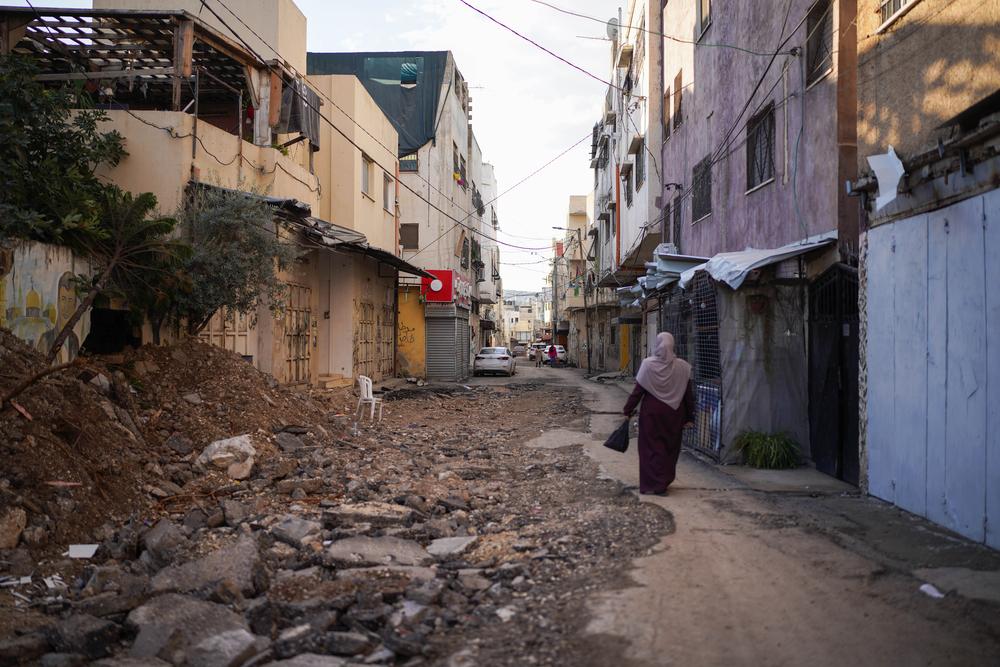
Jenin, West Bank, Palestinian Territories, November 2023. © MSF/Tetiana Gaviuk
As the raid began on 19 November, Amin was walking home when an Israeli soldier shot him in both legs. Despite there being a hospital next to the camp, the ambulance could not reach Amin for over two hours as Israeli forces restricted the movement of ambulances, surrounded the hospital, and cut off access to the facility by blocking the main road with armored vehicles.
Bleeding profusely, Amin was picked up from the street by a medical volunteer and taken to one of the few trauma stabilization points in the camp – a simple room with little more than a bed frame or a few medical supplies. The goal was simply to stop the bleeding.
Inside the camp, these trauma stabilization points, established, and run by self-organised local medical volunteers, are the only places where camp residents can receive life-saving medical help. Yet these points have been repeatedly targeted by drone strikes or destroyed and vandalized by ground troops. Israeli Forces are now preventing volunteers from rebuilding the trauma points or establishing new ones according to the camp volunteers.
“The situation here is horrible”, says one of the nurses working in Doctors Without Borders-supported Khalil Suleiman hospital located next to the refugee camp in Jenin city.
“We used to have a football team in the camp. From 20 players in the team, only seven are still alive, many of them have been killed since July 2023. They were young, between 17 and 22 years old”, adds the nurse.
The situation today in the West Bank and particularly in Jenin is extreme. We see significant unstick in violence against civilians, and it has been increasing rapidly since 7 October. Attacks on health care have increased dramatically and become systematic. The destruction of roads and infrastructure such as water pipes and sewage systems have also been alarming.Luz Saavedra, coordinator in Jenin
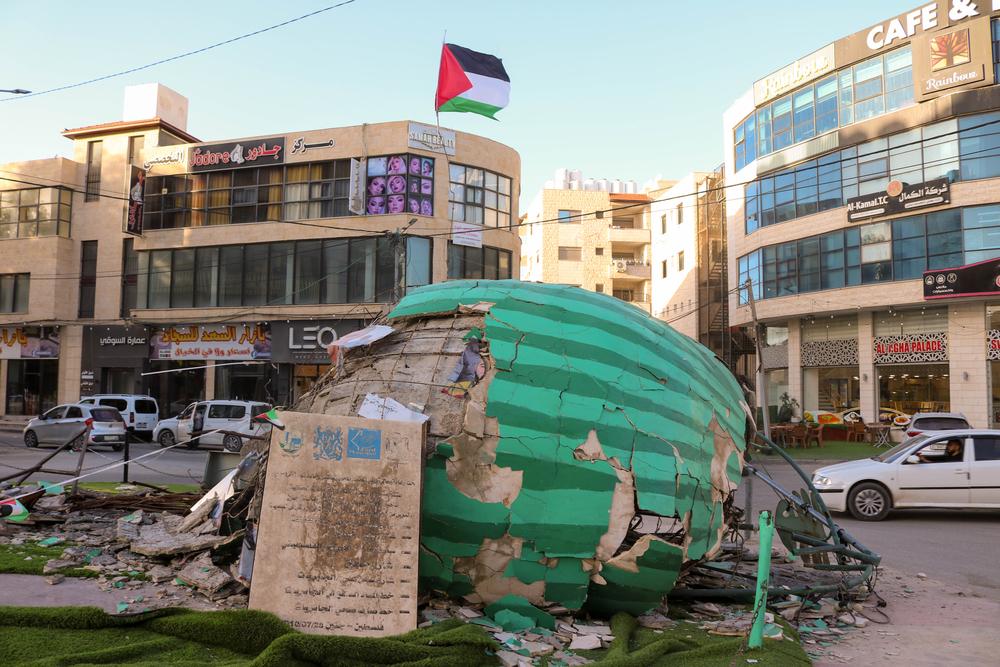
The watermelon roundabout, a symbol of Palestinian pride in Jenin, was destroyed during a military incursion in the city. Violent Israeli incursions in Jenin have become commonplace since 7 October. Jenin, West Bank, Palestine, November 2023. © Fariz Al-Jawad/MSF
In the last few weeks, Israeli forces have besieged multiple hospitals in Jenin, creating a direct impediment to health care, and even shot and killed a teenage boy in the Khalil Suleiman hospital compound. The obstruction of healthcare has unfortunately become common practice. During each incursion, various hospitals, including the public one, were surrounded by Israeli forces.
“The lack of respect for hospitals is staggering – since October, we have witnessed the shooting and killing of a 16-year-old boy in the hospital compound, soldiers firing live rounds and tear gas at the hospital several times, paramedics forced to strip and kneel in the street."
"Aside from the direct violence, the consistent blocking of access to healthcare is also putting the lives of camp residents at risk and appears to have become standard operating procedure for military forces during and following the military raids in Jenin. As obvious as it may sound, we cannot provide treatment for patients who don’t make it to the hospital. People in need must be able to safely access medical services and health facilities need to be protected.”
2023 has been the deadliest year for Palestinians in the West Bank. Amir may have survived this attack, but his future is uncertain. “Anyone can be targeted at any time here. We never know who will be next”, Amir says as he is about to be discharged from the hospital and returned to his home in the camp, now probably in a destroyed street.






